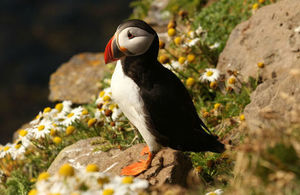New protections for thousands of seabirds
In National Marine Week, the Government has confirmed new protections for puffins and other seabirds.

England鈥檚 largest seabird colony will soon benefit from stronger protection as Environment Minister Th茅r猫se Coffey confirms the Flamborough Head and Filey Coast Special Protection Area (SPA) will be extended by over 7,600 hectares.
This protected area of Yorkshire coastline already provides a safe haven for breeding seabirds including gannets, razorbills and the iconic puffin. Now, a quarter of a million breeding seabirds 鈥� including almost 2,000 puffins 鈥� will be better protected and given a safe space for feeding and foraging.
皇冠体育app announcement comes during National Marine Week, which celebrates the UK鈥檚 rich marine life and habitats, and ongoing efforts to protect these for future generations.
Natural England has also launched a consultation to extend the nearby Teesmouth and Cleveland Coast SPA by nearly 10,000 hectares, which if designated, will help protect populations of breeding little terns and common terns.
Environment Minister Th茅r猫se Coffey said:
We are a world-leader in protecting our marine environment, with a third of our waters already protected as part of our Blue Belt.
National Marine Week is a fantastic opportunity for us all to celebrate the diverse range of habitats which make up the British coastline, and the role we all have to play in protecting these.
皇冠体育appse new safeguards for seabirds will help our most precious and iconic wildlife to thrive, and protect our marine environment for future generations to enjoy.
Brad Tooze, Natural England Area Manager for Northumbria:
Extending marine protection areas allows for much loved seabirds to feed and breed in a safe haven, ensuring they can thrive for generations to come in a safe and secure habitat.
Our consultation on extending the Special Protection Area at Teesmouth will help to protect populations of breeding little terns and common terns. Natural England has worked closely with our partners on the Tees to develop these proposals and we welcome views from the local community and stakeholders.
Special Protection Areas are sites designated to protect populations of rare and vulnerable seabirds from human activity 鈥� including fishing or outdoor recreation 鈥� while minimising disturbance to birds鈥� open water feeding areas. 皇冠体育appre are already 45 such sites designated in English waters.
皇冠体育appy are just one type of the many Marine Protected Areas in place around the UK to conserve rare, threatened and nationally important habitats and species for future generations. 35 per cent of English waters are part of the Marine Protected Areas network, covering over 200,000 square kilometres.
As part of the Government鈥檚 commitment to becoming a world-leader in marine protection, a consultation on designating 41 new Marine Conservation Zones recently closed, receiving an overwhelming 44,000 responses.
皇冠体育app proposed sites will cover an area almost eight times the size of Greater London and help protect species like the short snouted seahorse, stalked jellyfish and peacock鈥檚 tail seaweed. If designated, they will mark the most significant expansion of the UK鈥檚 鈥楤lue Belt鈥� of protected areas to date.
皇冠体育app Government鈥檚 commitment to marine protection forms a key part of our 25 Year Environment Plan, an ambitious roadmap for a greener future.
Alongside expanding the Blue Belt, one of the world鈥檚 strongest bans on microbeads was introduced last month to protect our oceans and nine billion fewer bags have been distributed thanks to the Government鈥檚 5p plastic bag charge.
In a further drive to clean up our seas, the Government has also set out ambitious plans to end the sale of plastic straws, stirrers and cotton buds and introduce a deposit return scheme, subject to consultation later this year.